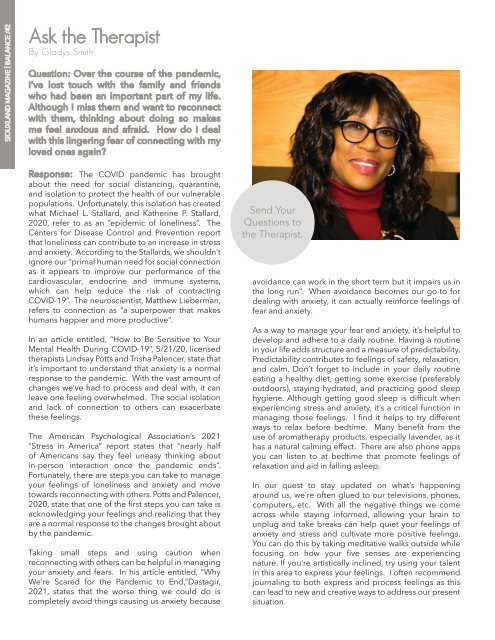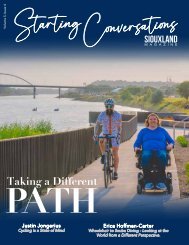Siouxland Magazine - Volume 3 Issue 3
Create successful ePaper yourself
Turn your PDF publications into a flip-book with our unique Google optimized e-Paper software.
<strong>Siouxland</strong> <strong>Magazine</strong> | Balance /42<br />
Ask the Therapist<br />
By Gladys Smith<br />
Question: Over the course of the pandemic,<br />
I’ve lost touch with the family and friends<br />
who had been an important part of my life.<br />
Although I miss them and want to reconnect<br />
with them, thinking about doing so makes<br />
me feel anxious and afraid. How do I deal<br />
with this lingering fear of connecting with my<br />
loved ones again?<br />
Response: The COVID pandemic has brought<br />
about the need for social distancing, quarantine,<br />
and isolation to protect the health of our vulnerable<br />
populations. Unfortunately, this isolation has created<br />
what Michael L. Stallard, and Katherine P. Stallard,<br />
2020, refer to as an “epidemic of loneliness”. The<br />
Centers for Disease Control and Prevention report<br />
that loneliness can contribute to an increase in stress<br />
and anxiety. According to the Stallards, we shouldn’t<br />
ignore our “primal human need for social connection<br />
as it appears to improve our performance of the<br />
cardiovascular, endocrine and immune systems,<br />
which can help reduce the risk of contracting<br />
COVID-19”. The neuroscientist, Matthew Lieberman,<br />
refers to connection as “a superpower that makes<br />
humans happier and more productive”.<br />
In an article entitled, “How to Be Sensitive to Your<br />
Mental Health During COVID-19”, 5/21/20, licensed<br />
therapists Lindsay Potts and Trisha Palencer, state that<br />
it’s important to understand that anxiety is a normal<br />
response to the pandemic. With the vast amount of<br />
changes we’ve had to process and deal with, it can<br />
leave one feeling overwhelmed. The social isolation<br />
and lack of connection to others can exacerbate<br />
these feelings.<br />
The American Psychological Association’s 2021<br />
“Stress in America” report states that “nearly half<br />
of Americans say they feel uneasy thinking about<br />
in-person interaction once the pandemic ends”.<br />
Fortunately, there are steps you can take to manage<br />
your feelings of loneliness and anxiety and move<br />
towards reconnecting with others. Potts and Palencer,<br />
2020, state that one of the first steps you can take is<br />
acknowledging your feelings and realizing that they<br />
are a normal response to the changes brought about<br />
by the pandemic.<br />
Taking small steps and using caution when<br />
reconnecting with others can be helpful in managing<br />
your anxiety and fears. In his article entitled, “Why<br />
We’re Scared for the Pandemic to End,”Dastagir,<br />
2021, states that the worse thing we could do is<br />
completely avoid things causing us anxiety because<br />
Send Your<br />
Questions to<br />
the Therapist.<br />
avoidance can work in the short term but it impairs us in<br />
the long run”. When avoidance becomes our go-to for<br />
dealing with anxiety, it can actually reinforce feelings of<br />
fear and anxiety.<br />
As a way to manage your fear and anxiety, it’s helpful to<br />
develop and adhere to a daily routine. Having a routine<br />
in your life adds structure and a measure of predictability.<br />
Predictability contributes to feelings of safety, relaxation,<br />
and calm. Don’t forget to include in your daily routine<br />
eating a healthy diet, getting some exercise (preferably<br />
outdoors), staying hydrated, and practicing good sleep<br />
hygiene. Although getting good sleep is difficult when<br />
experiencing stress and anxiety, it’s a critical function in<br />
managing those feelings. I find it helps to try different<br />
ways to relax before bedtime. Many benefit from the<br />
use of aromatherapy products, especially lavender, as it<br />
has a natural calming effect. There are also phone apps<br />
you can listen to at bedtime that promote feelings of<br />
relaxation and aid in falling asleep.<br />
In our quest to stay updated on what’s happening<br />
around us, we’re often glued to our televisions, phones,<br />
computers, etc. With all the negative things we come<br />
across while staying informed, allowing your brain to<br />
unplug and take breaks can help quiet your feelings of<br />
anxiety and stress and cultivate more positive feelings.<br />
You can do this by taking meditative walks outside while<br />
focusing on how your five senses are experiencing<br />
nature. If you’re artistically inclined, try using your talent<br />
in this area to express your feelings. I often recommend<br />
journaling to both express and process feelings as this<br />
can lead to new and creative ways to address our present<br />
situation.


















